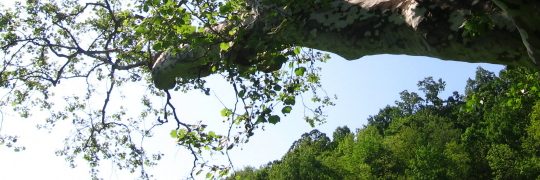Once we were actually on the road, life seemed better. The last time we had done this, I had had two cats, a one-year-old, and a 16-year-old nephew in the van, while Robert towed the car with the truck. This seemed simpler. We were aiming for Greenville, Texas, east of Dallas, where our daughter would spend the evening with us at the motel. Coordinating on our cell phones, we all arrived within minutes of each other. There was handy truck parking, and we had dinner at the catfish place next door. Hilde took her brother off to Wal-Mart on a mysterious errand, and came back with walkie-talkies. She had brought a deck of UNO cards and we played until late. This was the best part of the whole move.
It had been in the 80s all week. We woke the next day to freezing winds. Starting out east, the trees were coated with ice, but the interstate was fairly dry and the sky blue. We got about 25 miles when the truck disappeared from my rear-view mirror. Neither the walkie-talkie nor the cellphones worked well, but Robert managed to convey that the check-engine light had come on and the cab was full of alarm bells. I found a place to pull off at the next exit. Robert talked to Budget, complicated by the fact that we had no idea where we were except east of Greenville, and we waited for road service to arrive. He went to get a part, and we waited. We all made multiple trips to the Jack-in-a-Box up the road, and finally got back on the road. Maybe ten miles up the road, Robert called and said the truck was doing it again. I pulled off at the next exit, which was completely bare of anything except a defunct gas station with a gravel parking lot, now an Adult Attractions XXX. We waited for the road service mechanic, who came, took the truck for a test drive, and said it would have to go to the shop, which was back the way we had come, almost to Greenville. So Robert drove it down there, alarm bells ringing.
The shop was a diesel repair place on the interstate access road, miles from anywhere. There was no place for customers, and the bathroom was being used as a pen for a litter of German Shepherd puppies. Arend and I sat in the car and read, running the engine sporadically. There was talk of transferring the load. Budget was communicating with the mechanic, but not us. It being Sunday, the part that might be the problem could not be located, and might have to come from Dallas. We went back to Greenville and checked into another motel. Budget Road Service and Customer Service both claimed the other was calling the shots. We gave up and spent the evening looking at the weather on the NOAA website. We had been just ahead of the winter front, which had now passed us, with not much hope of our catching up with it. I called our daughter, declared the next time I moved it would be into a nursing home, and made her swear she would take care of it.
In the morning, we hung about the motel until checkout time, and then went to the shop. They had located the part, which would not arrive until three. We went to Commerce, 10 miles north, and hung out in Cowhill Express, a coffee shop on the square. We went to an outlet store, and to Wal-Mart. We must have eaten lunch somewhere. After 5, we finally got our truck back. We went to the next exit with a motel, Sulphur Springs. We had made 15 miles in two days. We had originally planned to get to Clarksburg on Monday morning. It was Monday night and we still had 1100 miles to go.



 West Virginia
West Virginia